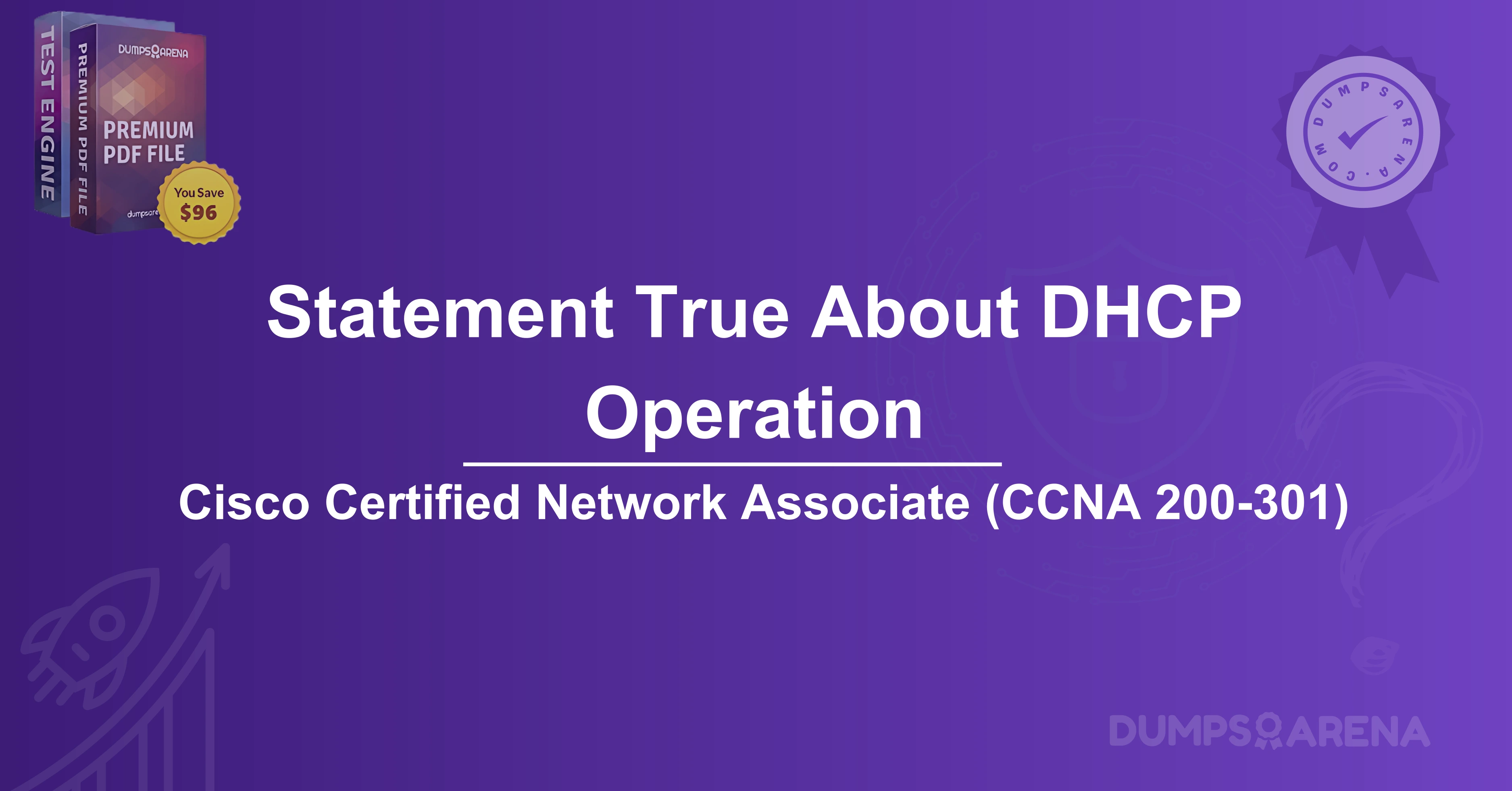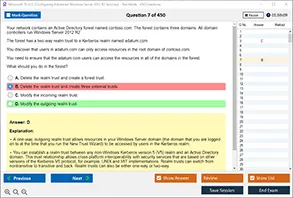Introduction
The Dynamic Host Configuration Protocol (DHCP) is a fundamental networking protocol that plays a critical role in modern network management. It simplifies the process of assigning IP addresses to devices on a network, ensuring seamless communication and reducing administrative overhead. For those preparing for the Cisco Certified Network Associate (CCNA) 200-301 exam, a deep understanding of DHCP operation is essential. This article will explore the true statements about DHCP operation, its relevance to the CCNA 200-301 exam, and how resources like DumpsArena can help you succeed in your certification journey.
What is DHCP?
DHCP is a network management protocol used to automatically assign IP addresses and other network configuration parameters to devices on a network. Without DHCP, network administrators would need to manually configure IP addresses for each device, which is time-consuming and prone to errors. DHCP ensures that devices can join a network and communicate efficiently without requiring manual intervention.
How Does DHCP Work?
To understand which statements are true about DHCP operation, let’s break down the DHCP process step by step:
1. DHCP Discovery
When a device (referred to as a DHCP client) connects to a network, it sends a DHCP Discover message. This is a broadcast message sent to all devices on the local network, asking for an available DHCP server.
2. DHCP Offer
A DHCP server on the network responds to the Discover message with a DHCP Offer. This message contains an available IP address, subnet mask, default gateway, and other network configuration details.
3. DHCP Request
The client receives the offer and sends a DHCP Request message to the server, formally requesting the offered IP address.
4. DHCP Acknowledgment
The DHCP server acknowledges the request by sending a DHCP Acknowledgment (ACK) message. This finalizes the IP address assignment, and the client can now use the assigned IP address to communicate on the network.
True Statements About DHCP Operation
When studying DHCP for the CCNA 200-301 exam, it’s important to know which statements about DHCP operation are true. Here are some key facts:
- DHCP Automates IP Address Assignment: DHCP eliminates the need for manual IP address configuration, making it easier to manage large networks.
- DHCP Uses UDP Ports 67 and 68: The DHCP server listens on UDP port 67, while the client listens on UDP port 68.
- DHCP Leases IP Addresses: DHCP assigns IP addresses for a specific period, known as a lease. Clients must renew their lease before it expires to continue using the IP address.
- DHCP Supports Multiple Scopes: A DHCP server can manage multiple IP address ranges (scopes) for different subnets.
- DHCP Relay Agents Enable Cross-Subnet Communication: A DHCP relay agent forwards DHCP messages between clients and servers on different subnets.
- DHCP Can Provide Additional Configuration: Besides IP addresses, DHCP can assign DNS servers, default gateways, and other network parameters.
- DHCP Works in Both IPv4 and IPv6 Networks: While DHCPv4 is used for IPv4 networks, DHCPv6 serves a similar purpose in IPv6 networks.
DHCP in the CCNA 200-301 Exam
The CCNA 200-301 exam tests your knowledge of networking fundamentals, including DHCP operation. Here’s how DHCP is relevant to the exam:
1. Network Fundamentals
DHCP is a core topic in the Network Fundamentals section of the CCNA 200-301 exam. You’ll need to understand how DHCP works, its role in IP address management, and how it interacts with other networking protocols.
2. IP Connectivity
DHCP plays a crucial role in ensuring IP connectivity by assigning IP addresses and other necessary configuration parameters. Questions on the exam may test your ability to troubleshoot DHCP-related issues.
3. Network Access
The cisco exam may include scenarios where you need to configure or troubleshoot DHCP on switches and routers. Understanding DHCP relay agents and their role in multi-subnet environments is essential.
4. Automation and Programmability
While DHCP itself is not directly related to automation, understanding its operation is crucial for managing modern networks, which often rely on automated IP address assignment.
Why Choose DumpsArena for CCNA 200-301 Exam Preparation?
Preparing for the CCNA 200-301 exam requires a combination of theoretical knowledge and practical skills. DumpsArena is a trusted resource that offers high-quality study materials, including practice questions, exam dumps, and detailed explanations. Here’s why DumpsArena stands out:
1. Comprehensive Study Materials
DumpsArena provides a wide range of study materials, including practice questions that cover all exam topics, including DHCP operation. These materials are designed to help you understand the concepts and apply them in real-world scenarios.
2. Real Exam Simulation
The practice tests on DumpsArena simulate the actual CCNA 200-301 exam, giving you a feel for the exam format and difficulty level. This helps you build confidence and improve your time management skills.
3. Detailed Explanations
Each question on DumpsArena comes with a detailed explanation, helping you understand the reasoning behind the correct answer. This is particularly useful for complex topics like DHCP operation.
4. Up-to-Date Content
DumpsArena regularly updates its study materials to reflect the latest changes in the CCNA 200-301 exam syllabus. This ensures that you’re studying the most relevant and accurate information.
5. Affordable Pricing
DumpsArena offers high-quality study materials at an affordable price, making it accessible to all aspiring CCNA candidates.
How DumpsArena Can Help You Master DHCP Operation?
DHCP is a critical topic in the Cisco exams, and mastering it requires both theoretical knowledge and practical experience. Here’s how DumpsArena can help:
1. Practice Questions on DHCP
DumpsArena offers a wide range of practice questions specifically focused on DHCP operation. These questions cover all aspects of DHCP, from basic concepts to advanced troubleshooting.
2. Hands-On Labs
While DumpsArena primarily focuses on exam preparation, it also provides guidance on setting up hands-on labs. Practicing DHCP configuration and troubleshooting in a lab environment is essential for reinforcing your knowledge.
3. Exam Tips and Tricks
DumpsArena’s study materials include tips and tricks for tackling DHCP-related questions on the CCNA 200-301 exam. These insights can help you approach the exam with confidence.
4. Community Support
DumpsArena has a vibrant community of CCNA candidates and certified professionals. Engaging with this community can provide additional insights and support as you prepare for the exam.
Conclusion
Understanding DHCP operation is essential for anyone pursuing the CCNA 200-301 certification. DHCP simplifies IP address management, ensures seamless network communication, and plays a critical role in modern networking. By mastering DHCP concepts and practicing with resources like DumpsArena, you can confidently tackle DHCP-related questions on the CCNA 200-301 exam and take a significant step toward achieving your certification goals.
DumpsArena’s comprehensive study materials, real exam simulations, and detailed explanations make it an invaluable resource for CCNA candidates. Whether you’re just starting your preparation or looking to fine-tune your knowledge, DumpsArena has everything you need to succeed. So, dive into your studies, leverage the power of DumpsArena, and ace the CCNA 200-301 exam with flying colors!
Get Accurate & Authentic 500+ CCNA 200-301 Exam Questions
1. WhAt is the primAry purpose of DHCP in A network?
A. To Assign stAtic IP Addresses to devices
B. To dynAmicAlly Assign IP Addresses to devices
C. To resolve domAin nAmes to IP Addresses
D. To encrypt network trAffic
2. Which of the following messAges is sent by A client to request An IP Address from A DHCP server?
A. DHCPACK
B. DHCPOFFER
C. DHCPDISCOVER
D. DHCPRELEASE
3. WhAt is the purpose of the DHCPOFFER messAge?
A. To confirm the IP Address Assignment
B. To releAse the IP Address bAck to the server
C. To propose An IP Address to the client
D. To discover AvAilAble DHCP servers
4. Which DHCP messAge is sent by the server to Acknowledge the IP Address Assignment?
A. DHCPREQUEST
B. DHCPACK
C. DHCPDISCOVER
D. DHCPOFFER
5. WhAt is the defAult port used by DHCP servers?
A. Port 53
B. Port 67
C. Port 80
D. Port 443
6. Which of the following is true About DHCP leAse time?
A. It is the time tAken for A DHCP server to respond to A client
B. It is the durAtion for which An IP Address is Assigned to A client
C. It is the time required for A client to discover A DHCP server
D. It is the time tAken for A DHCP server to releAse An IP Address
7. WhAt hAppens when A DHCP leAse expires?
A. The client must stop using the IP Address immediAtely
B. The client cAn no longer communicAte on the network
C. The client must request A renewAl of the IP Address
D. The DHCP server AutomAticAlly Assigns A new IP Address
8. Which of the following is true About the DHCPREQUEST messAge?
A. It is sent by the server to offer An IP Address
B. It is sent by the client to Accept An offered IP Address
C. It is sent by the client to discover DHCP servers
D. It is sent by the server to Acknowledge An IP Address Assignment
9. WhAt is the role of A DHCP relAy Agent?
A. To Assign IP Addresses to clients
B. To forwArd DHCP messAges between clients And servers on different subnets
C. To encrypt DHCP trAffic
D. To resolve IP Addresses to domAin nAmes
10. Which of the following is true About DHCP And stAtic IP Addresses?
A. DHCP cAnnot be used if A device hAs A stAtic IP Address
B. DHCP cAn override A stAtic IP Address configurAtion
C. DHCP is only used for Assigning stAtic IP Addresses
D. DHCP And stAtic IP Addresses cAn coexist on the sAme network



